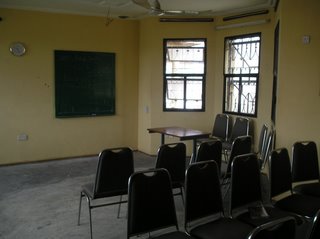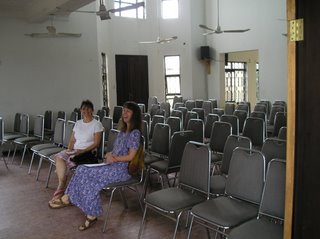One very interesting thing I learned during my time in Lagos is the results of a survey that the Nigerians like to publicize. The World Values Survey, publicized in 2003, found the Nigerians to be top on their list of 65 surveyed countries for the happiness of their people. "The survey is a worldwide investigation of socio-cultural and political change conducted about every four years by an international network of social scientists. It includes questions about how happy people are and how satisfied they are with their lives." That's from a BBC article about the results: here's the link to the article.
http://news.bbc.co.uk/1/hi/world/africa/3157570.stm
There's plenty of other stuff on the web about this survey as well. But when people hear about all the violence and kidnappings and killings, etc. etc. that goes on in Nigeria, it's difficult to reconcile that with the world's happiest people. And when a spoiled and pampered American such as myself sees how most Nigerians live -- the desperate poverty and unhygenic and difficult living conditions, it's hard to believe that they could be happy with their lives. Here's more from that BBC article:
"Nigeria has the highest percentage of happy people followed by Mexico, Venezuela, El Salvador and Puerto Rico, while Russia, Armenia and Romania have the fewest. But factors that make people happy may vary from one country to the next with personal success and self-expression being seen as the most important in the US, while in Japan, fulfilling the expectations of family and society is valued more highly. The survey appears to confirm the old adage that money cannot buy happiness. The researchers for World Values Survey described the desire for material goods as "a happiness suppressant". They say happiness levels have remained virtually the same in industrialised countries since World War II, although incomes have risen considerably."
Another article (http://www.transnational.org/forum/power/2004/01.01_NigeriaHappiness.html)
quotes Nigerians saying why they are happy:
"Peter puts it down to God and music. "We have a great religious faith. Whether we are Christians like us or Muslims as in the north, we all believe ardently that God is looking after us. We believe in being our brother's keeper". Ele is perhaps more perceptive, "people smile at you because that is the way they deal with the awful stress in their poverty stricken life. I can take you to people in the village who are hungry, who are not happy, and God is just in their lives to give them solace. One reason why many of us are happy is that we don't ask for much. If God gives us food we easily become happy. We are not greedy. Gloria said, "You see it in how we move. It's a movement inside us and in society. We feel full of music and love of God. Her friend, the business woman, added, "We Nigerians look after each other. If I know you and you are hungry or ill I will try and help". The engineer said: "It was in our old tribal traditions and religion built on that. Have you ever seen such a religious people?"
It's definitely something to think about. Oh yes, where did the US fall in the happiness survey? 16th place.
I'm a empty-nester mom of 3 and wife to an oil-company executive who is working on a project in Lagos, Nigeria. All many people hear about Lagos is bad stuff -- I'm here looking for the good in Lagos.
Friday, October 20, 2006
Monday, October 02, 2006
The 21st good thing about Lagos: Having a church congregation where I can worship, where I feel needed and welcome and where there's great singing!
 My second Sunday in Lagos we went to church in our local church congregation (our ward service, as differentiated from our larger stake conference the week before . The Victoria Island ward of the Church of Jesus Christ of Latter-Day Saints meets in a large rented house. It serves the purpose, though it's definitely not as nice as the church-built building on the mainland. Most of the congregations in the Stake have a permanent building, but we don't have the necessary numbers in our ward. It looks nicer on the outside than it does on the inside. (The American women warned me to avoid using the bathroom at all costs!) But the meetings were very nice and much like what I'm accustomed to in the States. We had the women's meeting (Relief Society) first.
My second Sunday in Lagos we went to church in our local church congregation (our ward service, as differentiated from our larger stake conference the week before . The Victoria Island ward of the Church of Jesus Christ of Latter-Day Saints meets in a large rented house. It serves the purpose, though it's definitely not as nice as the church-built building on the mainland. Most of the congregations in the Stake have a permanent building, but we don't have the necessary numbers in our ward. It looks nicer on the outside than it does on the inside. (The American women warned me to avoid using the bathroom at all costs!) But the meetings were very nice and much like what I'm accustomed to in the States. We had the women's meeting (Relief Society) first.
Here's a picture of the room, which is on the 2nd floor and pretty bare. But it was full of women with wonderfully colorful African clothes and big smiles and warm hearts. Though the room had bare cement floors and no other decoration -- they moved the table to the front and covered it with a bright blue tablecloth with the Relief Society motto stamped in gold on it -- "Charity never faileth." And on top was a blue vase with blue silk flowers. I was so moved by their efforts to beautify this spare room. Even in Nigeria, you can't get away from centerpieces in the RS classroom! The woman next to me shared her lesson manual and the teacher gave a great lesson and we had a nice discussion. I wanted to take a picture afterwards, but the women were gathered around me and introducing themselves and welcoming me. They were very sweet. I then went downstairs to the main chapel where we had Sunday School. The lesson was on Job, and it was very well-taught. As we were discussing the sufferings and trials of Job, I thought about what I guessed were the realities of the lives and trials of many of the members in that room. I know if many of us in our comfortable American lives were faced with what these Nigerians dealt with every day, we would consider ourselves as sorely tried as Job. We had been told that in the Stake, there is 60% unemployment among the members, but in our ward, there is 80% unemployment. And life is difficult for Nigerians even with jobs -- without work, I know that many of these people must live very desperate lives. But you wouldn't know it to look at them. I know it is a challenge for the expatriates who worship in Lagos, because they are sometimes approached and asked to help out families in situations of need. I'm sure they do provide help in many ways, but we are advised to remind them that the proper channel is to go to the bishop and ask for assistance and he will determine what is appropriate.
 My new expatriate LDS friends brought me by the church building earlier in the week, and I got this picture of them in the chapel. On Sunday, the power was out and I guess the church either doesn't have a generator, or it was out as well, because the fans and microphone weren't working. It wasn't too bad sitting next to an open window with a breeze, but I imagine on a hotter day, it could be very difficult! The keyboard must have a backup battery, because it worked. They had heard that I played the piano, and asked me to play for the sacrament meeting service. They usually just have a missionary (a Nigerian) playing the keyboard, and Brent had told me that though he tried, he wasn't very experienced. The missionary very sweetly asked if he could sit by me while I played and watch how I moved my fingers so he could learn from me. I was glad to have his help with figuring out the techicalities of the keyboard, as well. I wish I could have had time to teach him a few lessons -- he was so eager to learn and was disappointed to hear that I was leaving that day. After I left, Brent said that he had been transferred and the ward now doesn't have anyone to play, so they sing without accompaniment. He said they ask every week when I will be back. I hope that when I'm there I'll be able to teach some piano lessons to some ward members so that eventually they'll have permanent people there to play for them. But the Nigerians LOVE to sing! (Even if their hymn books are almost falling apart, as you see in the picture here.)
My new expatriate LDS friends brought me by the church building earlier in the week, and I got this picture of them in the chapel. On Sunday, the power was out and I guess the church either doesn't have a generator, or it was out as well, because the fans and microphone weren't working. It wasn't too bad sitting next to an open window with a breeze, but I imagine on a hotter day, it could be very difficult! The keyboard must have a backup battery, because it worked. They had heard that I played the piano, and asked me to play for the sacrament meeting service. They usually just have a missionary (a Nigerian) playing the keyboard, and Brent had told me that though he tried, he wasn't very experienced. The missionary very sweetly asked if he could sit by me while I played and watch how I moved my fingers so he could learn from me. I was glad to have his help with figuring out the techicalities of the keyboard, as well. I wish I could have had time to teach him a few lessons -- he was so eager to learn and was disappointed to hear that I was leaving that day. After I left, Brent said that he had been transferred and the ward now doesn't have anyone to play, so they sing without accompaniment. He said they ask every week when I will be back. I hope that when I'm there I'll be able to teach some piano lessons to some ward members so that eventually they'll have permanent people there to play for them. But the Nigerians LOVE to sing! (Even if their hymn books are almost falling apart, as you see in the picture here.) They sing out loud and strong and it's really exciting to be singing with them. We sang an intermediate hymn of "All Creatures of our God and King" and the ending was different than what they were used to -- the melody holds onto the note while the lower parts move and this confused some of them. So right after the meeting the bishop stood up and asked everyone to practice that hymn again because they had been singing it wrong and he wanted them to learn to do it right. I thought that was pretty neat. Also, during the meeting he sent me a note asking if I would bear my testimony in 2 minutes. This made me smile, because when we were over at our friend's house for dinner earlier in the week, they were discussing how in testimony meeting the bishop has a thing about not wanting people to speak for more than 2 minutes. He thinks if they talk longer they are taking someone else's time. He'll hold up a 2 minute warning sign, or nudge them to let them know they're going over their time limit. So I was careful to not talk too long. But the service itself was very good -- another missionary from Ghana was leaving to go home and he spoke his goodbye and told of his love for the people in the ward. There were probably a little over 100 people there in the meeting. Though the women were in brilliant African clothes, all the men in the room (except my husband, who wore a blue shirt that day) were dressed in Western dress with white shirts. One of the Americans had previously asked the bishop why the men never wear African dress to church and he had responded that they had been told that a white shirt is the appropriate dress for a priesthood holder and if they wanted to participate in the priesthood ordinances, they should wear a white shirt. I have mixed feelings about this. I know white shirts symbolize purity before God and I think it's a powerful symbol, though I do believe God cares much more about what's in our hearts than what we wear. But I was very touched by how all the men in the ward choose to obey their leader and honor their priesthood. I came away from worshipping with these Nigerian saints with the strong impression that though I certainly would be welcome and could contribute with things like my musical ability, I would also love the opportunity to learn from these humble and faithful people.
They sing out loud and strong and it's really exciting to be singing with them. We sang an intermediate hymn of "All Creatures of our God and King" and the ending was different than what they were used to -- the melody holds onto the note while the lower parts move and this confused some of them. So right after the meeting the bishop stood up and asked everyone to practice that hymn again because they had been singing it wrong and he wanted them to learn to do it right. I thought that was pretty neat. Also, during the meeting he sent me a note asking if I would bear my testimony in 2 minutes. This made me smile, because when we were over at our friend's house for dinner earlier in the week, they were discussing how in testimony meeting the bishop has a thing about not wanting people to speak for more than 2 minutes. He thinks if they talk longer they are taking someone else's time. He'll hold up a 2 minute warning sign, or nudge them to let them know they're going over their time limit. So I was careful to not talk too long. But the service itself was very good -- another missionary from Ghana was leaving to go home and he spoke his goodbye and told of his love for the people in the ward. There were probably a little over 100 people there in the meeting. Though the women were in brilliant African clothes, all the men in the room (except my husband, who wore a blue shirt that day) were dressed in Western dress with white shirts. One of the Americans had previously asked the bishop why the men never wear African dress to church and he had responded that they had been told that a white shirt is the appropriate dress for a priesthood holder and if they wanted to participate in the priesthood ordinances, they should wear a white shirt. I have mixed feelings about this. I know white shirts symbolize purity before God and I think it's a powerful symbol, though I do believe God cares much more about what's in our hearts than what we wear. But I was very touched by how all the men in the ward choose to obey their leader and honor their priesthood. I came away from worshipping with these Nigerian saints with the strong impression that though I certainly would be welcome and could contribute with things like my musical ability, I would also love the opportunity to learn from these humble and faithful people.
Subscribe to:
Comments (Atom)